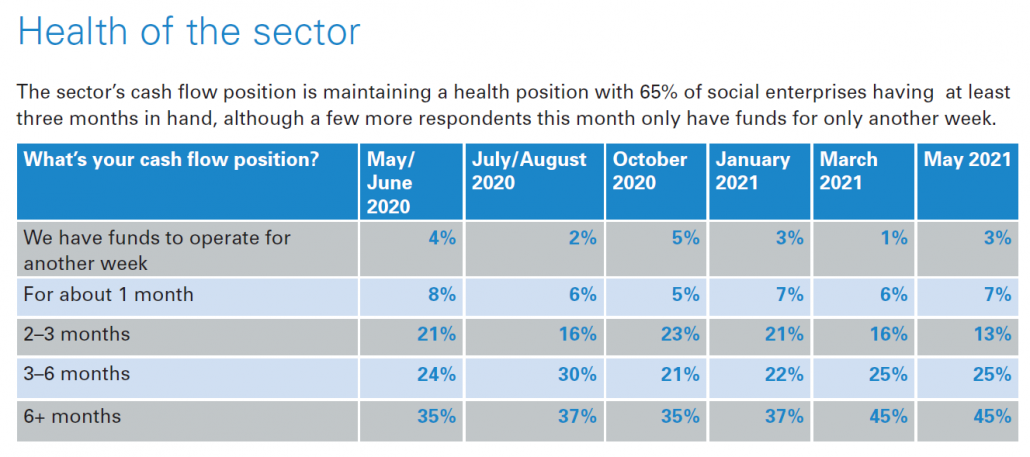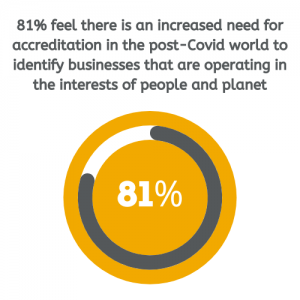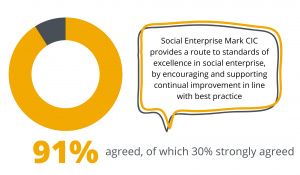The role of accreditation in
the Post-Covid world
Our 2021 stakeholder survey findings make for encouraging reading. Given the extreme challenges of the previous year, it was promising to see a general feeling of optimism for the future. The majority of respondents were positive they could continue trading for more than a year, with only a handful reporting they would only be able to continue for 3-6 months in the current trading conditions at that time (Feb/March 2021).
A similar position is reflected in recent sector research from Social UK, which shows 65% of social enterprises have grown a healthy cashflow to support them for at least the next three months. This reinforces the earlier findings in February, which showed 65% of social enterprises expected to hold their position or grow.
Source: Social Enterprise UK
Comments from our survey suggest there is a renewed and strengthened determination to collectively take the opportunity to change the way we all do business for good, to put social enterprise front and centre, as we look to recover from the economic effects of the pandemic.
“Over the pandemic people have pulled together more, and I think now might be the time for social enterprises to be the solution for many of the jaded adults who are fed-up with mass consumption, and massive profits going to a few. They want to be part of something, rather than a bystander.” Emma Lower, CEO of Lendology CIC
As we know from our recent Making a Mark competition, social enterprises went above and beyond in their response to the Covid-19 outbreak, adapting to the constantly changing situation to provide much needed support to local communities and wider society.
At a time when there is much talk about ‘purposeful business’ and ‘building back better’, it is clear that social enterprises have led the way in this regard and need more recognition for this leadership. Social enterprises are not a social bolt-on afterthought to try to show how we are engaging with UN Sustainable Development Goals; we have this mission at our very core. Nor are we the charity sector asking for more grants (although this of course would be nice!) We are using our business model to create true sustainability owned and led by its stakeholders who can maximise social value in any investments made by governments and prove it.
 The importance of proving this was also reinforced via consensus from survey respondents on the increased need for accreditation in the post-Covid world, in order to identify businesses that are genuinely operating in the interests of people and planet, rather than being driven by the requirement to create shareholder profit.
The importance of proving this was also reinforced via consensus from survey respondents on the increased need for accreditation in the post-Covid world, in order to identify businesses that are genuinely operating in the interests of people and planet, rather than being driven by the requirement to create shareholder profit.
With the proliferation of businesses now looking to demonstrate their ‘purpose’, it will undoubtedly become more important to have standards that hold businesses to account on their sustainability claims. In this vein, the Competition and Markets Authority (CMA) has recently set out recommendations for businesses when making such claims, after their research found that 4 in 10 corporates in the sectors analysed are providing misleading sustainability-related claims.
This highlights the importance of accreditation and standards systems in an increasingly crowded marketplace, where more and more businesses are wanting to align themselves to the purposeful business agenda. Although, it is positive to see a movement towards mainstream businesses wanting to become more sustainable, and focus on more than just profits, I am cynical (along with many others in our sector) that it is more often than not a marketing ploy in response to the rise in consumer and investor demand for more ethical products and services.
As the CMA’s chief executive Andrea Coscelli said: “Too many websites appear to be pushing misleading claims onto consumers, which means that companies offering products with a genuine environmental benefit are not getting the customers they deserve. People should be able to easily choose between those companies who are doing the right thing for the environment and those who are not.”
Although the CMA research was more product focused, the same point applies to service providers and B2B markets, where we are also seeing a rise in the use of communications around purpose and sustainability, which can generate confusion as to which businesses are actually ‘walking the talk” when it comes to their claims around their social and environmental responsibility.
All this points towards a new mandate for accreditation – to provide independent verification of such claims and to uphold robust and relevant standards by which businesses can be held to account. As an organisation that has been providing accreditation for the social enterprise sector for more than a decade, we pride ourselves on the comprehensive pathway to standards of good practice and excellence that we have developed to recognise and build the capabilities of social enterprises as competitive, sustainable businesses, dedicated to maximising social impact above shareholder profit.
I am pleased to say that feedback from our network of accredited social enterprises shows that we are achieving this. 90% of respondents to our stakeholder survey said that our social enterprise accreditation reinforces their positioning as a business that is primarily committed to using profits to maximise social impact above that of individual gain. This was up from an already high 83% in our last stakeholder survey in 2019.
 An overwhelming majority (91%) also agreed that Social Enterprise Mark CIC provides a route to standards of excellence in social enterprise, by encouraging and supporting continual improvement in line with best practice. This was up from 87% in the 2019 survey.
An overwhelming majority (91%) also agreed that Social Enterprise Mark CIC provides a route to standards of excellence in social enterprise, by encouraging and supporting continual improvement in line with best practice. This was up from 87% in the 2019 survey.
It was also positive to see that 9 out of 10 of our Mark holders would recommend our accreditation to other social enterprises, which suggests we are providing a worthwhile and useful service for the sector.
Of course, there is always room for improvement, and we continually look to adapt and evolve our standards to ensure we are addressing the changing needs of the growing social enterprise sector. The survey responses contained constructive feedback in terms of what we could do better, which included the indication that there is more work to be done in increasing wider awareness of social enterprise in general, as well as our social enterprise accreditations and the role they play in creating a fairer and more resilient economy.
“I’m not sure how well known the Mark is. We still need more awareness of it to reach the levels of Fair Trade/Living Wage etc to have more impact.” Gareth Hart, Founder of Iridescent Ideas
The general outlook for social enterprises is good, but we need to do more to raise our game, and show how we change lives whilst developing better friendships and alliances with those that share our views. At the moment it feels like we are the hidden treasure. We all bear a responsibility to share our news more widely but we do need more volume and less timidity about why our business model is best, along with asserting our core differences from the mainstream – i.e. putting stakeholders and social/environmental mission first, reinvesting for good and proving our social value.
the Post-Covid world






Great blog, Lucy. We are in a moment in which giving back and being part of society and facing up challenges such as COVID and the climate emergency are compelling and relevant to more people than ever. Purpose has landed, but quality matters when claims and intentions are easy to come by. We need to be as good at marketing as any out there, but at the same time, building systems of trust and learning through accreditation is an inescapable part of what it will take for social enterprise to succeed as a business model.
Thanks for your comment Ed. We totally agree that quality and substance is so important when it comes to claims of purpose. We feel accreditation plays a strong part in generating trust in business